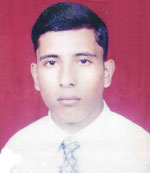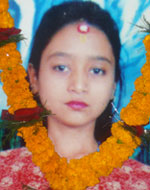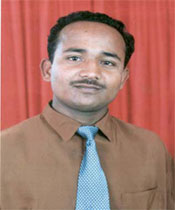Related Links
Case Updates
Krishna Adhikari
 On 6 June 2004, Krishna Prasad Adhikari, a resident of Fujel village of Gorkha District, was murdered in Chitwan District by Maoist cadres. Krishna Prasad was visiting his grandparents after having taken the SLC examinations, and he was abducted from Bakullahar Chowk by men who came on a motorcycle ...
On 6 June 2004, Krishna Prasad Adhikari, a resident of Fujel village of Gorkha District, was murdered in Chitwan District by Maoist cadres. Krishna Prasad was visiting his grandparents after having taken the SLC examinations, and he was abducted from Bakullahar Chowk by men who came on a motorcycle ... Maina Sunuwar
 Around 6 am on February 17, 2004, a group of RNA soldiers arrested Ms
Maina Sunuwar, a 15-year-old schoolgirl of Kharelthok VDC-6, Kavre
district. She disappeared since her arrest. Her family members, with
support from villagers and school where Maina was a student, visited
detention centers ...
Around 6 am on February 17, 2004, a group of RNA soldiers arrested Ms
Maina Sunuwar, a 15-year-old schoolgirl of Kharelthok VDC-6, Kavre
district. She disappeared since her arrest. Her family members, with
support from villagers and school where Maina was a student, visited
detention centers ... Sanjeev Kumar Karna
 Sanjeev Kumar Karna was one among the 11 persons arrested on October 8, 2003. On that fateful day, they had gone to attend a picnic program organized by the students at a place called Kariyachauri VDC-4, and from picnic, they went to Kataiya Chowri Area of Dhanusha district where they ate some food ...
Sanjeev Kumar Karna was one among the 11 persons arrested on October 8, 2003. On that fateful day, they had gone to attend a picnic program organized by the students at a place called Kariyachauri VDC-4, and from picnic, they went to Kataiya Chowri Area of Dhanusha district where they ate some food ... Arjun Bahadur Lama
Hari Prasad Bolakhe
Sarala Sapkota
Birendra Shah
Bishwanath Parajuli, Tom Nath Poudel and Dhan Bahadur Tamang
Chot Nath Ghimire and Shekhar Nath Ghimire
Bhauna Tharu
At the occasion of the Universal Periodic Review NGOs call on Nepal to end impunity for torture and other serious human rights violations
Geneva, 3 November 2016.Advocacy Forum-Nepal (AFN), the Asian Human Rights Commission (AHRC), REDRESS and the World Organisation against Torture (OMCT) made a stakeholder submission to the Universal Periodic Review of Nepal taking place on 4 November 2015. The submission details the continued impunity for serious human rights violations committed during the armed conflict and highlights the ongoing and systematic practice of torture in detention.
Although Nepal has been facing various challenges, justice cannot be sacrificed. We are deeply concerned about the government’s continuous refusal to address impunity and the denial of justice for victims of human rights violations during armed conflicts.
From 1996 to 2006, Nepal was gripped by an internal armed conflict between security forces and the Communist Party of Nepal, with both sides being responsible for serious human rights violations. Despite promises made during the last UPR review in 2011 to investigate and prosecute those crimes, Nepal has failed to take effective actions. No members of the military, the police, the Armed Police Force or Maoist groups have been brought to justice. Furthermore, those accused of serious human rights violations are promoted to higher government position. Legislation passed last year to establish a Truth and Reconciliation Commission and Enforced Disappearances Commission circumvents justice processes and paves the way for further impunity.
At the same time, victims face numerous obstacles when seeking justice.The police have systematically refused to register complaints, which is indispensible for the prosecution of any crime. In addition, the previous Attorney General, the Nepal Army and the Communist Party of Nepal have interfered with police investigations by threatening key witnesses or by misusing the power to withdraw charges.
The entrenched impunity for past crimes committed allows for ongoing human rights violations in the country.The stakeholder submission details Nepal’s systemic practice of torture in detention and the lack of implementation of recommendations by the Committee against Torture. Nepal has neither passed legislation that criminalizes torture, nor has it put a system in place that allows for meaningful redress or adequate compensation for torture victims.Torture and ill-treatment for the purpose of obtaining confessions is still practiced as a method of criminal investigation.
The organisations call on the international community to recommend Nepal to:
- amend the legislation establishing transitional justice mechanisms to expressly prohibit amnesty for crimes under international law and in line with Supreme Court decisions;
- establish a special unit of appropriately trained police and prosecutors to investigate and prosecute serious human violations committed in Nepal;
- criminalise torture and other forms of ill-treatment, enforced disappearance, crimes against humanity and war crimes;
- combat impunity by bringing to justice any individual alleged to be responsible for torture and other serious human rights abuses committed during the armed conflict and since;
- take effective measures to prevent interference with police investigations and to introduce severe penalties for any such interference;
- ratify the Optional Protocol to the Convention Against Torture, establish an effective National Preventive Mechanism, and provide for full redress to victims of torture in compliance with the Convention against Torture.
The universal periodic review of Nepal will take place in Geneva on Wednesday, 4 November 2015 at 2:30 pm (GMT+1). It can be followed live at http://webtv.un.org. NGOs will also be reporting from Geneva using Twitter - follow #NepalUPR
The organistions’ submission to the UPR is available here: http://www.redress.org/downloads/publications/150322UPR_Nepal.pdf.
For more information, please contact:
- AFN: Dr. Trilochan Upreti (Executive Director) on +977 9841351286 or upretitrilochan252@gmail.com
- AHRC: Prakash Mohara (Programme Coordinator – Nepal Desk) prakash.mohara@ahrc.asia
- REDRESS: Eva Sanchis (Communications Officer) on +44 (0)20 7793 177 or eva@redress.org
- OMCT: Nicole Bürli (Human Rights Advisor) on +41 (0)22 809 49 26 or nb@omct.org
























Join Us